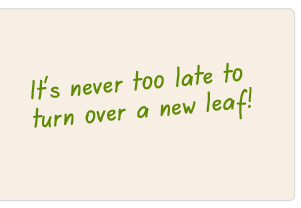 It’s February already!
It’s February already!
With the winter we’ve experienced so far this year, I think it’s safe to say that the snow and cold weather won’t be gone any time soon–despite whether the groundhog did or didn’t see his shadow.
Remember to add snow shovelling and extra driving time to your schedule as needed. But don’t let the cold weather deter you from your important tasks!
So let’s get started and turn over another leaf!
COMPULSIVE HOARDING
When I tell people I’m a professional organizer, the conversation inevitably gets around to the topic of hoarding. This month I’d like to clarify some misconceptions about this topic.
With the popularity of programs such as A&E’s The Hoarders and TLC’sHoarding: Buried Alive, this once taboo subject is now seeing the light of day.The Hoarders begins each episode with the statement “more than 3 million people are compulsive hoarders.” This is an estimate only, as there is no accurate way of knowing the actual number.
Definition of Hoarding
When people tell me they know someone who is a hoarder, I caution them to be careful how they use the term “hoarder.” Many people are very quick to pass judgment or jump to conclusions about the people in these scenarios. Keep in mind that these episodes are real-life situations. It can be difficult and/or heartbreaking to watch. Understanding and compassion are needed by these people.
A&E provides the following definition: “Compulsive hoarding is a mental disorder marked by an obsessive need to acquire and keep things, even if the items are worthless, hazardous, or unsanitary.”
The Fairfax County, Virginia government provided the following information on their website:
“Hoarding is not limited to any age, race, gender or nationality. Hoarding behavior can begin early in life but is more prevalent in older adults. Hoarders can be of any educational or socio-economic level. They are unaware that their living circumstances pose a danger to themselves and to others. They are unable to change unsafe conditions on their own.”
Signs of Hoarding
Geralin Thomas, a professional organizer who has appeared on The Hoarders,advises that the signs of hoarding may include:
- “Extreme [acquisition] and storage of items in the home and in the yard
- Accumulation of combustible materials
- Blocked exits (doors/windows)
- Narrow pathways in the home
- Rat and/or insect infestations
- Rotting food and/or used food containers
- Human and/or animal waste
- Long-term neglect of home maintenance
- Non-working utilities, such as heat, running water, sewer, refrigeration”
Hoarding Situations
Unsafe living conditions can be discovered by emergency personnel such as police, fire and paramedics. Neighbours will sometimes report a person to authorities because their yard has become an eyesore.
In a number of episodes, the hoarder has been reported to authorities. It is not uncommon for them to live in fear of being evicted or having their children removed from the home.
What NOT To Do
A common misperception is that hoarders are lazy or just can’t be bothered. Geralin strongly emphasizes that a hoarder “can’t do” it, not “won’t do” it.
Clearing out the clutter will not solve the problem if the underlying root cause is not being dealt with in the proper manner. The hoarder must make the decisions about what will remain in the living space and what will be removed. It is not uncommon for people living with a hoarder to make the situation worse. Irreparable harm can be done to relationships.
The best thing you can do is encourage a suspected hoarder to seek professional help. Do not attempt to handle this type of situation by yourself, or with the help of family members, unless you are qualified.
Treatment
In 2013 the 5th edition of the Diagnostic and Statistical Manual of Mental Disorders defined compulsive hoarding as a distinct disorder within the chapter about obsessive-compulsive and related disorders.
A group of people (including socialservice workers, psychological/mental health professionals, professional organizers, etc.) may need to be assembled to determine and provide the required treatment. Successful treatment can include cognitive behavioural therapy combined with the use of medication. Often a hoarder does not comprehend that they have a problem. It is extremely important to realize that not everyone is willing to accept help or treatment.
Education
The Institute for Challenging Disorganization (ICD) in the United States is a non-profit educational organization whose mission is “to provide education, research and strategies to benefit people challenged by chronic disorganization.” ICD developed a Clutter-Hoarding Scale with Levels I-V on a continuum. This scale “is an assessment measurement tool . . . to give professional organizers and related professionals definitive parameters.” For more information, please go to their website, and click on the Resources tab.
If you or someone you love is looking for help, contact me and I can direct you to local professionals for assistance. Communities are starting to establish task forces to deal with hoarding issues.
Online Support Groups
Children of Hoarders – support for those who grew up in a hoarding environment and/or currently have a relative who hoards. Many resources, online videos, shared stories and more are provided.
Squalor Survivors – stories, photos, tools, community forums and chat, resources and information for people who know someone who hoards
 It’s March!
It’s March! 



.jpg)


Connect with us Online